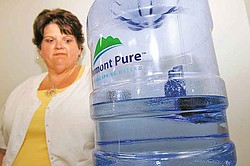Bottled water is dilemma for Vermont offices
ASSOCIATED PRESS
In this July 22, 2011 photo, Lori Girard-Pion stands by the water cooler at her state office in Colchester, Vt. Vermont state officials, who announced in March that they would pull the plug on water coolers and bottled water deliveries in state offices and buildings, are reconsidering the move amid a wave of complaints from workers. Calling bottled water a waste of taxpayer money, the state had said it hoped to save up to $200,000 annually by having workers use fountains and tap water instead. They said the change would help the environment, too, since toxic chemicals go into the making of plastic water bottles and ecologically-sensitive stream headwaters areas are damaged in the process of bottling. But many state workers have since complained that the tap water in their buildings is dirty or that they’ll have no way to get clean drinking water if the state stops buying bottled water for them. (AP Photo/Toby Talbot)
Associated Press
MONTPELIER, Vt.
At the state maintenance garage where Lori Girard-Pion works, the water cooler isn’t a luxury. It’s a necessity, especially for the mechanics who maintain the Vermont State Police vehicle fleet.
So when the state of Vermont said it was doing away with bottled-water deliveries for state government offices and buildings in favor of drinking water from the tap, she wasn’t happy.
Without it, workers at the Colchester garage will have to get their drinking water from a bathroom wash tub where mechanics wash their greasy hands, she says.
“Is that a lot to ask for?” Girard- Pion, an administrative assistant, wrote in a complaint to the state last month. “I think we have good reasons to keep our water cooler.”
Turns out kicking the bottle is harder than it looks.
Now, state officials who touted the change as a way to go easy on the environment, save more than $200,000 annually on water purchases and support municipal water systems are scrambling to salvage the plan.
Workplace sanitation rules, tap water said to be smelly or visibly dirty and stiff opposition from employees insulted by the thought of having to provide their own water forced the administration of Gov. Peter Shumlin to postpone the July 1 adoption of the new policy.
In March, state officials rolled out the plan, calling bottled water a waste of taxpayer money and a luxury that flies in the face of the millions of dollars invested in public water systems to ensure the availability of clean, drinkable water for all.
Agency of Natural Resources Secretary Deb Markowitz cited environmental degradation associated with bottled water, saying toxic chemicals go into plastic water bottles, delivery trucks pollute the air and ecologically-sensitive stream headwaters are damaged by bottlers who draw the water from streams and rivers.
Under the policy, exceptions would be made when no clean tap water is available to employees, either because of no tap at all or problems with water quality.
The policy was to apply to executive branch locations of state government — not courts or the Legislature — and had the support of the Vermont State Employees Association, a union that represents about 7,000 state workers.
But when word went out, the complaints started coming in.
Rules got in the way, too.
 43
43

